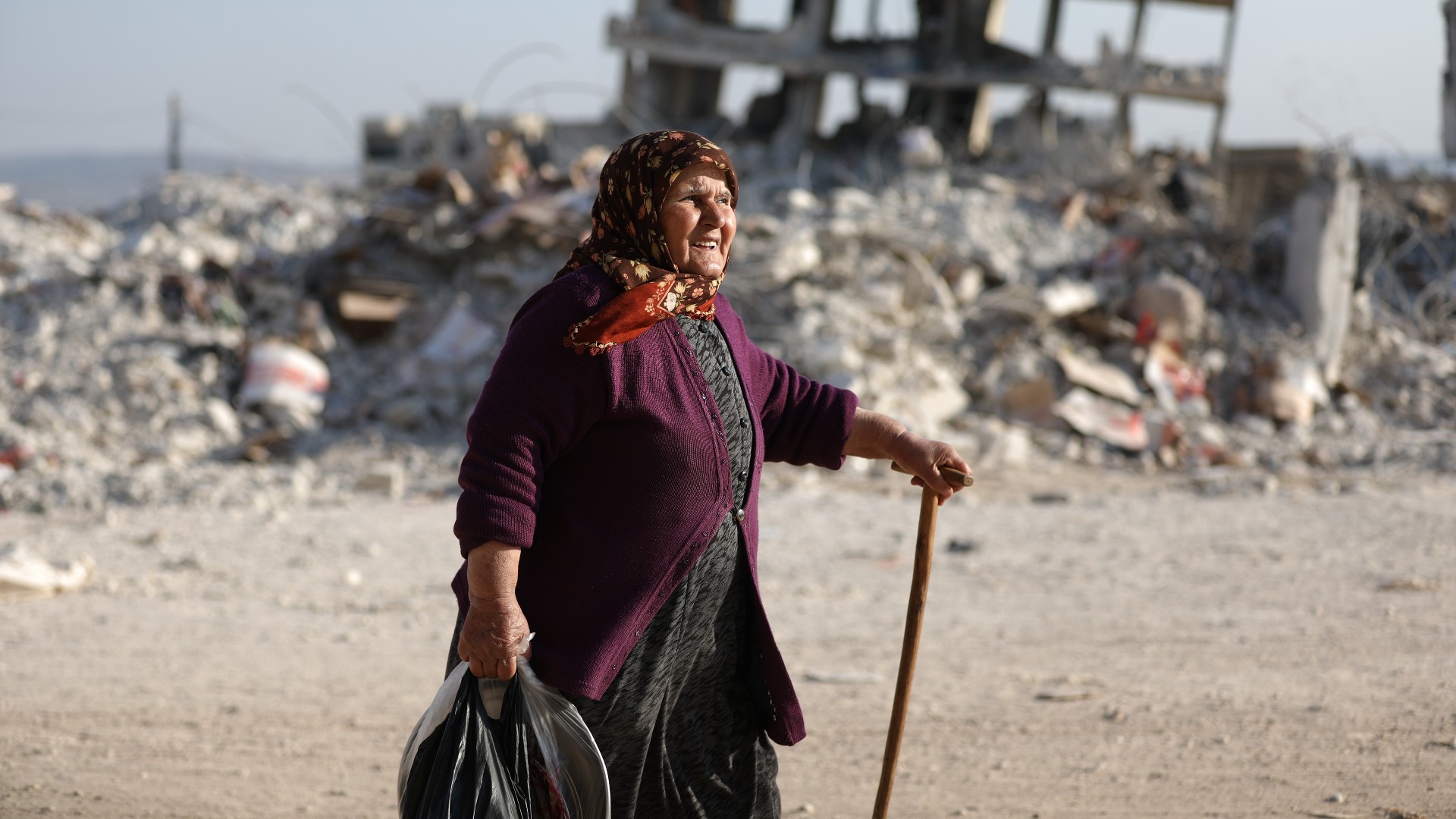Syrians lament disaster after disaster in earthquake ravaged Jindayris
Jindayris, northwest Syria - For five days, Faisal Baydoun and his family stood helpless in the freezing cold as the cries of their neighbours still buried under the rubble rang out.
Like thousands of others in the Syrian border town of Jindayris, they waited patiently for help to come, praying that the international community would rush to assist the recovery efforts with heavy machinery as their loved ones remained trapped, deep under crumpled buildings in this war-battered area.
Only now, 10 days after a massive 7.8 magnitude earthquake levelled large swathes of southern Turkey and northwest Syria, families such as his are receiving the help they crucially need to recover the living - and the dead - from under the debris.
"Everyone in Jindayris has lost people: whether they be family, relatives or friends," Baydoun told Middle East Eye.
"I have lost many people in this disaster."
New MEE newsletter: Jerusalem Dispatch
Sign up to get the latest insights and analysis on Israel-Palestine, alongside Turkey Unpacked and other MEE newsletters
The biggest earthquake to strike Turkey in eight decades also wreaked new devastation in northwest Syria, an impoverished region that provides the last pocket of sanctuary for the opposition that rose up against President Bashar al-Assad's authoritarian government 12 years ago.
Before the quake, Syria's uprising-turned-civil war had already displaced half the country's pre-war population of 23 million. The Baydouns were among them, fleeing from their home in another part of the country for Jindayris four years ago.
Now the earthquake has caused a new wave of displacement, leaving them fearful for the future.
'It was terrifying'
When the earthquake struck on Monday, the Baydouns said they were awoken by a sudden jolt that quickly became more and more violent.
They luckily escaped before their home crumbled to dust and, after spending nearly a week in the frigid cold, they are now housed in a tent that sits bare after most of their possessions were lost in the wreckage.
"It was terrifying but I was more afraid for my family," he said.
Northwest Syria relies almost entirely on aid for survival, but post-quake international assistance has been slow to reach this area. A UN aid convoy that was arranged well before the quake reached the opposition-held areas from Turkey on Thursday, three days after the disaster.
Before that, the only cargo coming across the Bab al-Hawa crossing on the Turkey-Syria border was a steady stream of bodies of earthquake victims coming home for burial.
UN Under-Secretary-General for Humanitarian Affairs Martin Griffiths, who visited the Turkish-Syrian border on Sunday, acknowledged that Syrians were left "looking for international help that hasn't arrived".
"We have so far failed the people in northwest Syria. They rightly feel abandoned," he said. "My duty and our obligation is to correct this failure as fast as we can."
Adding to their woes, food prices are going up across much of the rebel-held Idlib and Aleppo provinces due to limited supplies.
'I don't know what I will do'
Raed Saleh, the head of the Syrian Civil Defence, also known as the White Helmets, said Griffiths' visit was "too little, too late", adding that calls for international assistance by local rescue teams had gone unheeded for days.
According to local residents, at least 1,000 lives have been lost in Jindayris with more than 250 buildings levelled.
Ahmed Abu Zaid, who severely injured his leg in the quake, said despite everything he has endured he counts himself among the fortunate.
Now living with his family of five in a makeshift tent, his quick actions at 4:17am on that fateful morning are credited with saving the lives of his extended family.
Rushing outside the moment the ground shook, he immediately checked on the fate of his daughter and granddaughter who lived next door, he told MEE.
"Because of my fear, I did not feel the pain in my leg and I thought of nothing but my family.
"The joy of meeting them safely is not equal to the treasures of the world combined."
With hope fading for those still trapped under the rubble, Abu Zaid said frustration was growing among many of Jindayris' residents who were trying to survive in tarpaulin tents under freezing temperatures with dwindling food and medical supplies.
"I don't know what I will do with the coming days. This is the second time that I lose my home and my property, but I always thank God that my family members are still near me, and they are the ones from whom I draw my strength."
Middle East Eye delivers independent and unrivalled coverage and analysis of the Middle East, North Africa and beyond. To learn more about republishing this content and the associated fees, please fill out this form. More about MEE can be found here.









